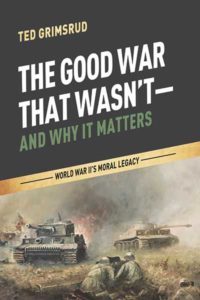The Good War That Wasn’t—and Why It Matters: World War II’s Moral Legacy
Reviewed by William H. Mueller
September 1, 2016
 By Ted Grimsrud. Cascade Books, 2014. 286 pages. $35/paperback; $9.99/eBook.
By Ted Grimsrud. Cascade Books, 2014. 286 pages. $35/paperback; $9.99/eBook.
Buy from QuakerBooks
“All war is immoral.” —Curtis LeMay, commander of American Air Forces, Asiatic-Pacific Theater of WWII
Deeply entrenched in American thought is the idea that World War II was a “good” war, one worth fighting, proving once and for all that, when all is said and done, the only effective force against evil is military might. This “myth of redemptive violence” is part of the moral legacy of WWII that professor Ted Grimsrud examines in this important and thought-provoking book, an essential read for all peacemakers.
The author is a Mennonite minister and professor of theology and peace studies at Eastern Mennonite University. His concern is the widespread acceptance of war and preparation for war in the United States today. Most of us believe America fought in a good, if horrific, war; Americans fight in good wars; when Americans fight, there must be a good reason. This unquestioned view of WWII as a “good and necessary” war has contributed to the ease with which post-war military interventions have become the mainstay of U.S. foreign policy. One could say that this is the principal moral legacy of WWII: the transformation of our country into a “national security state,” with a de facto military government independent of constitutional constraint and representative government, something that has never happened before. How could this be and what has it done—and what does it continue to do—to us as a supposedly democratic people?
I call this book “essential” for peacemakers, because a “good war” attitude, more than anything else, has lent an aura of respectability to and acceptance of killing other human beings in the name of “national interest,” always under a subterfuge of “national security.” I notice a routine acceptance of torture and a shoulder-shrugging attitude regarding civilian deaths in the War on Terror, for example. In the meantime, our status as a caring and democratic nation ready to lend a hand in the causes of equality and economic development, whether to our own or to others, has all but disappeared.
Professor Grimsrud examines why America went to war and whether our stated goals for a better world were achieved thereby, whether allied conduct during the war was “just” and the cost worth it, and America’s changed role in world affairs after WWII. Finally, he considers what could have been done instead of going to war, and at the end offers a practical guide for “reversing WWII’s moral legacy.”
He reviews other recent studies of the ethical implications of WWII, and I’ll mention one he identifies: Michael Burleigh’s Moral Combat: A History of WWII (2010), which to his credit (as he is encouraging us to listen to an opposing view), he describes as being “in some ways an alternative interpretation of WWII’s moral legacy to mine.” Listening to an opponent is the start to all good peacemaking!
Friends’ traditional testimony against war seems all but dead in the water these days. Grimsrud’s important work may be the beginning of a turnaround for our country, the world, and for the moral activism that characterized our religious society from its beginnings, and may yet do so again. (See more of Grimsrud’s work at peacetheology.net.)



Comments on Friendsjournal.org may be used in the Forum of the print magazine and may be edited for length and clarity.